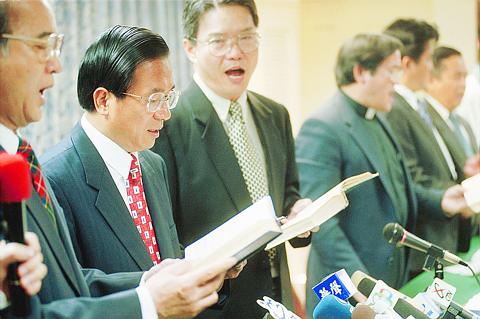DPP heavyweights announced yesterday that they intend to propose amendments to the party's charter that would remove its founding pro-independence principles.
Senior officials said the proposal would be taken up at the party's central advisory committee meeting today, where they would put the removal of the "independence guidelines" on the table in an attempt to counter claims made during the election that the DPP's policies were dangerous.
"The independence guidelines should be regarded as a historical document and words such as `establishing the Republic of Taiwan' should be deleted," said Chen Chao-nan (

PHOTO: CHEN CHENG-CHANG, TAIPEI TIMES
He stressed that Taiwan's independent sovereignty has already been carried out by democratic developments, under which Taiwan-ese can now elect their own president freely and have already established a democratic legislature.
Chen said that the independence guidelines had become a weakness for the DPP, forcing its candidates onto the defensive in elections.
It is also a thorny issue in President-elect Chen Shui-bian's (
"The main point of our guidelines is `to use plebiscite measures' to establish an independent sovereign Republic of Taiwan," Chen said.
"Now we only need to delete `Republic of Taiwan' and `to rewrite the constitution' and then add `to firmly establish an independent sovereign and autonomous country, while any changes to the status quo should be decided by plebiscite.'"
Vice President-elect Annette Lu (
"It proves that the DPP is not a rigid party and realizes the importance of changing in order to face both the rest of the world and Taiwan's own society," Lu said.
President-elect Chen, meanwhile, made an appeal to Chinese leaders yesterday during a Presbyterian Church service in Taipei, saying that only with a considerate, humble heart can they truly seek peace in the Taiwan Strait.
Leaders of the DPP's Justice Alliance faction, organized by the president-elect in 1993, said that they agreed with the proposal to modify the pro-independence guidelines, but that the proper thing to do would be to revise all the party's guidelines, instead of focusing on one particular part.
"We should not only solve problems after they occur," said DPP legislator Chen Chi-mai (陳其邁).
"We should offer a complete plan to modify our party guidelines in order to create a new image," he said.

CHAOS: Iranians took to the streets playing celebratory music after reports of Khamenei’s death on Saturday, while mourners also gathered in Tehran yesterday Iranian Supreme Leader Ayatollah Ali Khamenei was killed in a major attack on Iran launched by Israel and the US, throwing the future of the Islamic republic into doubt and raising the risk of regional instability. Iranian state television and the state-run IRNA news agency announced the 86-year-old’s death early yesterday. US President Donald Trump said it gave Iranians their “greatest chance” to “take back” their country. The announcements came after a joint US and Israeli aerial bombardment that targeted Iranian military and governmental sites. Trump said the “heavy and pinpoint bombing” would continue through the week or as long

TRUST: The KMT said it respected the US’ timing and considerations, and hoped it would continue to honor its commitments to helping Taiwan bolster its defenses and deterrence US President Donald Trump is delaying a multibillion-dollar arms sale to Taiwan to ensure his visit to Beijing is successful, a New York Times report said. The weapons sales package has stalled in the US Department of State, the report said, citing US officials it did not identify. The White House has told agencies not to push forward ahead of Trump’s meeting with Chinese President Xi Jinping (習近平), it said. The two last month held a phone call to discuss trade and geopolitical flashpoints ahead of the summit. Xi raised the Taiwan issue and urged the US to handle arms sales to

BIG SPENDERS: Foreign investors bought the most Taiwan equities since 2005, signaling confidence that an AI boom would continue to benefit chipmakers Taiwan Semiconductor Manufacturing Co’s (TSMC, 台積電) market capitalization swelled to US$2 trillion for the first time following a 4.25 percent rally in its American depositary receipts (ADR) overnight, putting the world’s biggest contract chipmaker sixth on the list of the world’s biggest companies by market capitalization, just behind Amazon.com Inc. The site CompaniesMarketcap.com ranked TSMC ahead of Saudi Aramco and Meta Platforms Inc. The Taiwanese company’s ADRs on Tuesday surged to US$385.75 on the New York Stock Exchange, as strong demand for artificial intelligence (AI) applications led to chip supply constraints and boost revenue growth to record-breaking levels. Each TSMC ADR represents

State-run CPC Corp, Taiwan (CPC, 台灣中油) yesterday said that it had confirmed on Saturday night with its liquefied natural gas (LNG) and crude oil suppliers that shipments are proceeding as scheduled and that domestic supplies remain unaffected. The CPC yesterday announced the gasoline and diesel prices will rise by NT$0.2 and NT$0.4 per liter, respectively, starting Monday, citing Middle East tensions and blizzards in the eastern United States. CPC also iterated it has been reducing the proportion of crude oil imports from the Middle East and diversifying its supply sources in the past few years in response to geopolitical risks, expanding